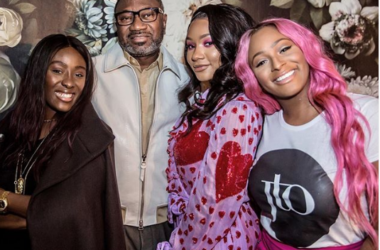When the subject of leadership is brought up, more often than not, we find that the names of men tend to dominate the discourse. This is especially so on the African continent where most cultures have for millennia precluded women from rising to the top formally. That unseen yet ubiquitous glass ceiling exists till this day despite the notable feat of women like Ellen Johnson Sirleaf who have chipped at it, managed to crack it open just a bit and emerged to become the Presidents of their nations. Today many more women are scaling some of the hitherto difficult-and-near-impossible-to-scale walls erected by patriarchy and that is laudable indeed. However, their achievements would not have been possible but for some of the women who paved the way for them. Surely the telling of history would be incomplete and indeed unjust without acknowledging them.
In the most populous black nation on the earth, one of the greatest women leaders and arguably the most influential is also one of the most unsung. Born in 1948 as the product of a marriage across tribal lines -a rarity in those days, her path to national and indeed intercontinental prominence seemed unlikely. That she emerged and was profoundly impactful during the era of military rule and dictators is perhaps the cleverly disguised hand of fate at work. That a project she began in her lifetime and which was discontinued in 1993 immediately comes to mind when her name is mentioned is proof that her life’s work succeeded in creating a great legacy for her even though that may not have been her chief goal when she commenced it. That woman is Maryam Babangida.
Chances are that if you have lived long enough, her “Better Life Programme for Rural Women” would have come to mind as soon as you read her name in the last line of the previous paragraph. The likelihood too of thinking of her as Nigeria’s first First Lady would be high even though there were other women who preceded her in being spouses of men who had ruled Nigeria. Truly she was iconic. She was strikingly beautiful and her glowing brown skin was a notable and welcome departure from what was becoming a disturbing national skin bleaching craze at the time, so much so that iconic musician Fela Kuti had sang about ladies bleaching their skins. She very well could have been the poster girl for the “Brown Skin Girl” movement, and Beyonce and Wizkid would not have been mistaken to choose her. Indeed, she was stylish and supremely so, way before fashion shows and runways became a prominent feature of Nigeria’s sociocultural landscape. Her fortitude, strategic mind and magnetic personality unofficially shaped many government policies during her years as First Lady and it is testament to this that despite the sometimes harsh and unflattering colours and unforgiving paintbrushes that some Nigerians paint her husband over the events of June 12 1992, she has remained even in death largely unblemished by that blight.
Today in the Nigerian political landscape we see more and more women emerging. We see wives of governors, legislators and political leaders visibly contributing to national development. The pioneering behind-the-scenes work of Maryam Babangida in her heyday towards this is largely unheralded but it was she who as First Lady of Nigeria saw to it that wives of military administrators –or governors in today’s terms- were given a platform of service to the nation and to that very important constituency without which no poverty alleviation can succeed: women. The word back then was that due to her influence, it was nearly impossible for any military officer to become a state administrator if he was estranged from his first wife or upon reconciliation would not give his first wife the honour of serving as his First Lady. How she did this is the stuff of legend but can easily be seen as the product of a good woman’s heart, having been married to a military officer, lived in the barracks and seen around her environment some of the pains many army officers and soldiers’ wives went through. That she chose to execute the Better Life Programme at state level through the strategic partnership with governor’s wives not only empowered those women personally and collectively, it for the first time in national history gave women a visible role in national development that paved the way for what we have today. This is even more remarkable given that the “office of the First Lady” was unofficial, had no legislated funding yet was able to have national impact. That speaks to great vision and incredible leadership.
If you look at the revolutionary work of Nobel Peace Prize winning microfinance pioneer Muhammad Yunus in Bangladesh who made women the focal point of his intervention to alleviate poverty, you will see the uncanny yet entirely coincidental similarity with Nigeria’s Better Life program. Arguably Maryam Babangida’s program proved to be more impactful bearing in mind events at the time. For instance, there was a brewing national food crisis despite the involvement of hundreds of thousands –if not millions- of rural women in agriculture. Also per capita income was falling nationally as the bite of the Structural Adjustment Programme was being felt. The program successfully organized rural women into cooperative societies and one of the things this did was that it found a way around restrictive traditional rights to land that often disallowed women from owning their own land even for the purpose of growing crops. The program’s cooperative societies were enabled to procure larger farmlands through traditional rulers and local government councils. They also had access to capital and credit facilities, to modern agricultural technology and techniques. Many rural women at that time had never seen a tractor or fertilizer but the Better Life program brought these to their reach and made farming easier and more productive for them.
Some of the core and critical issues that Maryam Babangida’s “Better Life” program for rural women addressed were truly issues germane to national development. Education and the eradication of illiteracy especially for the girl child was within its purview. Improved maternal and child care was too and the program galvanized national action on immunization against diseases. Access to potable water for rural communities was anther achievement of the program, as was the provision of social welfare services. Perhaps the most loved of the program’s activities was its provision of vocational education and training for rural women. There are many successful adults in Nigeria today who were educated through school from the proceeds of work done from the vocational education that their mothers received from the Better Life programme for Rural Women. No national project since then has even come close to achieving its success and truth be told, it serves as the bar and motivation for many similar projects conceived in Nigeria and across Africa since then.
If we carve our names on peoples’ hearts by our good works, a respectable legacy is the inevitable outcome and posterity will speak well of us. Maryam Babangida did that and even though she exited this world almost a decade ago, her impact lives on and she is much loved. Fond memories of her abound all over the nation and it lends credence to the view that to live in the hearts of those you love is not to die. As successful as her Better Life program was, her greatest success is the beautiful children she birthed, nurtured and along with her husband raised into respectable, distinguished eminent members of society. Even though her husband was a Muslim and the religion permits a man to have up to four wives, that such a debonair, dashing gentleman officer and one so powerful stuck to her throughout her life points to a truth that one woman can bring a man so much peace and joy that she becomes to him worth more than several women. To this day the gap-toothed former of Head of State misses her dearly and it is evident that his darling Maryam is forever irreplaceable. A diamond is forever and it was his unique privilege and delight to have her as his. It was our delight as well to see them and we will not, despite the passage of time, ever forget Nigeria’s foremost First Lady, the inimitable Maryam Babangida.






